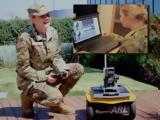U.S. Army research enables conversational AI between soldiers and robots
Dialogue is one of the most basic ways humans use language and is a desirable capability for autonomous systems. Army researchers developed a novel dialogue capability to transform Soldier-robot interaction and perform joint tasks at operational speeds. The fluid communication achieved by dialogue will reduce training overhead in controlling autonomous systems and improve
Researchers from the U.S. Army Combat Capabilities Development Command’s Army Research Laboratory, in collaboration with the University of Southern California’s Institute for Creative Technologies, developed the Joint Understanding and Dialogue Interface, or JUDI, capability, which enables bi-directional conversational interactions between Soldiers and autonomous systems.
The Institute for Creative Technologies, or ICT, is a Department of Defense-sponsored University Affiliated Research Center, or UARC, working in collaboration with DOD services and organizations. UARCs are aligned with prestigious institutions conducting research at the forefront of science and innovation. ICT brings film and game industry artists together with computer and social scientists to study and develop immersive media for military training, health therapies, education and more.
This effort supports the Next-Generation Combat Vehicle Army Modernization Priority and the Army Priority Research Area for Autonomy through the reduction of Soldier burden when teaming with autonomous systems and by allowing verbal command and control of systems.
“Dialogue will be a critical capability for autonomous systems operating across multiple echelons of Multi-Domain Operations so that Soldiers across land, air, sea and information spaces can maintain situational awareness on the battlefield,” said Dr. Matthew Marge, a research scientist at the laboratory. “This technology enables a Soldier to interact with autonomous systems through bidirectional speech and dialogue in tactical operations where verbal task instructions can be used for command and control of a mobile robot. In turn, the technology gives the robot the ability to ask for clarification or provide status updates as tasks are completed. Instead of relying on pre-specified, and possibly outdated, information about a mission, dialogue enables these systems to supplement their understanding of the world by conversing with human teammates.”
In this innovative approach, he said, dialogue processing is based on a statistical classification method that interprets a Soldier’s intent from their spoken language. The classifier was trained on a small dataset of human-robot dialogue where human experimenters stood in for the robot’s autonomy during initial phases of the research.
The software developed as part of the collaboration with USC ICT leverages technologies developed in the institute’s Virtual Human Toolkit.
“JUDI’s ability to leverage natural language will reduce the learning curve for Soldiers who will need to control or team with robots, some of which may contribute different capabilities to a mission, like scouting or delivery of supplies,” Marge said.
The goal, he said, is to shift the paradigm of Soldier-robot interaction from today’s heads-down, hands-full joystick operation of robots to a heads-up, hands-free mode of interaction where a Soldier can team with one or more robots while maintaining situational awareness of their surroundings.
According to the researchers, JUDI is distinct from current similar research conducted in the commercial realm.
“Commercial industry has largely focused on intelligent personal assistants like Siri and Alexa – systems that can retrieve factual knowledge and perform specialized tasks like setting reminders, but do not reason over the immediate physical surroundings,” Marge said. “These systems also rely on cloud connectivity and large, labeled datasets to learn how to perform tasks.”
In contrast, Marge said, JUDI is designed for tasks that require reasoning in the physical world, where data is sparse because it requires previous human-robot interaction and there is little to no reliable cloud-connectivity. Current intelligent personal assistants may rely on thousands of training examples, while JUDI can be tailored to a task with only hundreds, an order of magnitude smaller.
Source: armyrecognition.com
The post U.S. Army research enables conversational AI between soldiers and robots appeared first on ARMYNOW.NET.
- Δημοφιλέστερες Ειδήσεις Κατηγορίας Blogs
- Τι αλλάζει από 1η Σεπτεμβρίου στην αναγνώριση των εξ αποστάσεως τίτλων σπουδών
- ΤΟ ΞΕΣΠΑΣΜΑ του Γιάννη Στάνκογλου για τον κορονοϊό! «ΚΑΤΑΡΓΗΣΤΕ τα όλα λοιπόν! Σας σιχάθηκα γιατί είστε υποκριτές...»
- Αυτοκίνητο τυλίχθηκε στις φλόγες στην εθνική οδό Αθηνών – Λαμίας
- Εορτολόγιο-Ποιοι γιορτάζουν σήμερα 1 Αυγούστου: Καλό μήνα, ευχές- Καλή Παναγιά
- Κορονοϊός-Ένοπλες Δυνάμεις: Έκτακτα μέτρα προστασίας - Πού είναι υποχρεωτική η χρήση μάσκας
- Οι πολιτικές εφημερίδες 1/8/2020
- ΕΚΤΑΚΤΟ ΔΕΛΤΙΟ ΕΠΙΔΕΙΝΩΣΗΣ ΚΑΙΡΟΥ: ΕΜΥ πρόγνωση σήμερα 1 Αυγούστου-Καλό μήνα
- Έκτακτο δελτίο ΕΜΥ: Ραγδαία αλλαγή του καιρού – Έρχονται καταιγίδες
- Ποιες πτήσεις απαγορεύονται και από ποιες χώρες
- Μετά την "Ελευθεροτυπία" κλείνει και το "Εθνος" : Λιγότερα Μέσα, μονοσήμαντη η ενημέρωση και η Δημοκρατία. Της Ναταλίας Χατζηαντωνίου
- Δημοφιλέστερες Ειδήσεις Armynow

- Τελευταία Νέα Armynow
- U.S. Army research enables conversational AI between soldiers and robots
- Lockheed Martin awarded USD 15 billion for future C-130J work
- Coronavirus could cause US to lose Iraqi Kurdish region to China
- Turkey’s Authoritarian Policy on NATO Principles
- Iran launched underground ballistic missiles for first time
- Analysis – Turkey forges military pact with Niger, Libya’s neighbour
- Cyprus says Putin committed to help defuse drilling tensions with Turkey
- Pompeo: Threats to US in Afghanistan raised with Russian officials
- “Navy SEAL” admits faking military career, defrauding Veteran’s Affairs out of $300k
- German Heron TP UAV makes its maiden flight
- Τελευταία Νέα Κατηγορίας Blogs
- ΑΑΔΕ: Ποιες εφαρμογές δεν θα είναι διαθέσιμες λόγω ενοποιήσεων ΔΟΥ
- Οι πολιτικές εφημερίδες 1/8/2020
- Κορονοϊός: Συμφωνία «μαμούθ» της Ευρωπαϊκής Ένωσης με τη Sanofi για 300 εκατ. δόσεις εμβολίου
- Σεισμός 3,8 Ρίχτερ ανοιχτά της Κρήτης
- Χαρίτσης για αναδρομικά: Επιλογή Μητσοτάκη το κούρεμα 70% και ο αποκλεισμός 1,6 εκατ. συνταξιούχων
- Ντόναλντ Τραμπ: Απαγορεύει το TikTok στις ΗΠΑ
- Κορονοϊός: Περισσότεροι από 1.400 νέοι θάνατοι στις ΗΠΑ - Σαρώνει στο Μεξικό
- NBA: Με ηγέτη τον Αντετοκούνμπο οι Μπακς ξεπέρασαν τους Σέλτικς
- Θεσσαλονίκη: Παρουσιάστηκε το πρώτο πανελλαδικά ποδήλατο για ΑμεΑ που θα διατίθεται δωρεάν- ΦΩΤΟ



